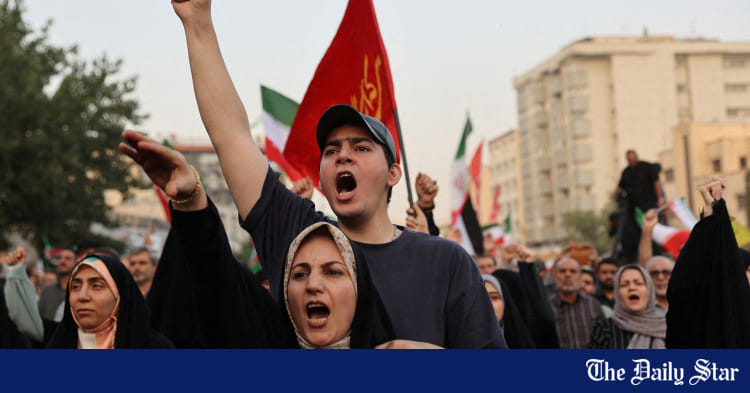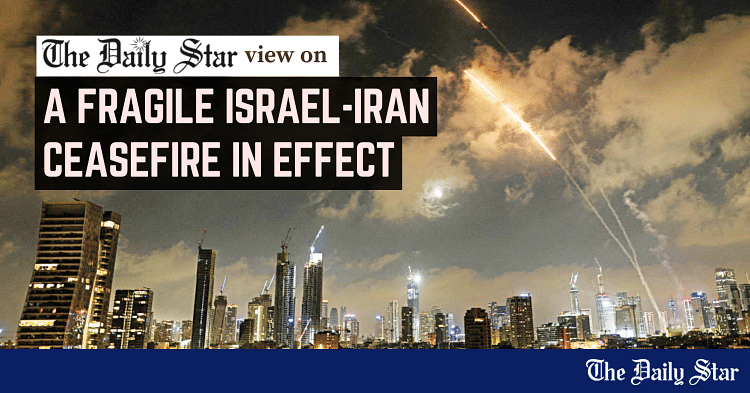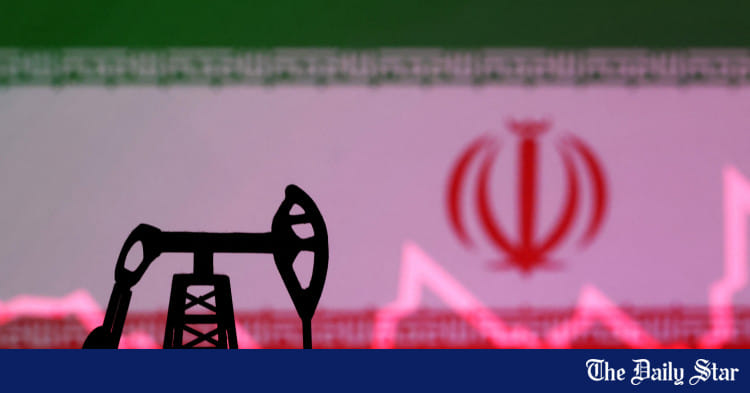Saif
Senior Member
- 13,556
- 7,382
- Origin

- Axis Group


Iran willing to return to talks as ceasefire with Israel takes hold
Iranian President Masoud Pezeshkian said his country would continue to "assert its legitimate rights" to the peaceful use of atomic power
Iran willing to return to talks as ceasefire with Israel takes hold

People gesture as they attend a gathering to support Iran's Armed Forces, after US President Donald Trump announced a ceasefire between Israel and Iran, in Tehran, Iran, June 24, 2025. Photo: Reuters/Majid Asgaripour
Iran said on Tuesday that it was ready to return to negotiations with the United States, as a fragile ceasefire in its war with Israel took hold after 12 days of strikes that pummelled the Islamic republic's nuclear facilities.
But even as he appeared to express willingness to revisit nuclear talks derailed by Israel's surprise attack, Iranian President Masoud Pezeshkian said his country would continue to "assert its legitimate rights" to the peaceful use of atomic power.
The United States on Sunday had joined Israel's campaign with strikes on key nuclear sites.
After Iran retaliated with a missile attack Monday night targeting a US base in Qatar, President Donald Trump called for de-escalation, announcing the contours of a truce deal hours later.
In a phone call Tuesday, Pezeshkian told his Emirati counterpart "to explain to them, in your dealings with the United States, that the Islamic Republic of Iran is only seeking to assert its legitimate rights".
"It has never sought to acquire nuclear weapons and does not seek them," he was quoted as saying by the official IRNA news agency, adding that Iran was "ready to resolve the issues... at the negotiating table".
Israel has said its war, which began on June 13, was aimed at preventing Iran from acquiring a nuclear weapon, an ambition Tehran has long denied holding.
After Trump angrily berated both sides for early violations of the truce on Tuesday, Tehran announced it would respect the terms of the deal if Israel did the same, while Israel said it had refrained from further strikes.
- Claims of victory -
Both Israel and Iran appeared to claim victory following the announcement of the truce.
The Israeli government said Prime Minister Benjamin Netanyahu had convened his cabinet "to announce that Israel had achieved all the objectives of Operation Rising Lion and much more".
It added that it had removed the "dual existential threat" of Iran's nuclear and ballistic missile programmes, while vowing to respond forcefully to any violations of the ceasefire.
Iran's top security body, meanwhile, said the Islamic republic's forces had "compelled" Israel to "unilaterally" stand down.
Its Revolutionary Guards also hailed a last-minute missile salvo fired at Israel as "a historic and unforgettable lesson to the Zionist enemy".
Israeli rescuers reported four people killed when a missile struck a residential building in the southern city of Beersheba early Tuesday.
In Iran, state television said an overnight Israeli strike in the north killed nuclear scientist Mohammad Reza Seddighi Saber, who was under US sanctions.
- Strikes on US base -
Over the course of its campaign, Israeli strikes hit nuclear and military targets -- killing scientists and army brass -- as well as residential areas, prompting waves of Iranian missile attacks on Israel.
While Iran and Israel have been locked in a shadow war for decades, it has been by far the most destructive confrontation between the arch-foes.
The war saw US strikes on Iranian nuclear sites using massive bunker-busting bombs, followed by an Iranian reprisal targeting the United States' largest military facility in the Middle East.
Trump shrugged off that response as "weak", thanking Tehran for giving advanced notice and announcing the outline of the ceasefire just hours later.
Iran's National Security Council had said the number of missiles launched at the base "was the same as the number of bombs that the US had used" against Iran.
Ali Vaez, Iran project director for the International Crisis Group, told AFP: "This was calibrated and telegraphed in a way that would not result in any American casualties, so that there is an off ramp for both sides."
- 'Everyone is tired' -
Some Israelis on Tuesday welcomed the prospect of a truce.
"Everyone is tired. We just want to have some peace of mind," said Tel Aviv resident Tammy Shel, voicing hope for a lasting ceasefire. "For us, for the Iranian people, for the Palestinians, for everyone in the region."
In Iran, people remained uncertain whether the peace would hold. Amir, 28, fled from Tehran to the Caspian Sea coast and told AFP by phone, "I really don't know... about the ceasefire but honestly, I don't think things will return to normal."
Israeli strikes on Iran have killed at least 610 civilians and wounded more than 4,700, according to the health ministry.
Iran's attacks on Israel have killed 28 people, according to official figures and rescuers.
The international community reacted with cautious optimism to news of the truce.
Saudi Arabia and the European Union welcomed Trump's announcement, while Kremlin spokesman Dmitry Peskov said Russia hoped "that this will be a sustainable ceasefire".
But French President Emmanuel Macron warned there was an "increased" risk that Iran would attempt to enrich uranium secretly following the strikes on its nuclear sites.
During their talks, Iran and the United States had been at odds over the former's uranium enrichment, which Tehran considers a "non-negotiable" right and which Washington has called a "red line".
After the truce was announced, some turned their attention to the ongoing fighting between Israel and Hamas in the Gaza Strip, arguing it was time to bring an end to that war too.
The Palestinian Authority, Israel's opposition leader and the main group representing the families of Israeli hostages all called for a Gaza ceasefire.
People gesture as they attend a gathering to support Iran's Armed Forces, after US President Donald Trump announced a ceasefire between Israel and Iran, in Tehran, Iran, June 24, 2025. Photo: Reuters/Majid Asgaripour
Iran said on Tuesday that it was ready to return to negotiations with the United States, as a fragile ceasefire in its war with Israel took hold after 12 days of strikes that pummelled the Islamic republic's nuclear facilities.
But even as he appeared to express willingness to revisit nuclear talks derailed by Israel's surprise attack, Iranian President Masoud Pezeshkian said his country would continue to "assert its legitimate rights" to the peaceful use of atomic power.
The United States on Sunday had joined Israel's campaign with strikes on key nuclear sites.
After Iran retaliated with a missile attack Monday night targeting a US base in Qatar, President Donald Trump called for de-escalation, announcing the contours of a truce deal hours later.
In a phone call Tuesday, Pezeshkian told his Emirati counterpart "to explain to them, in your dealings with the United States, that the Islamic Republic of Iran is only seeking to assert its legitimate rights".
"It has never sought to acquire nuclear weapons and does not seek them," he was quoted as saying by the official IRNA news agency, adding that Iran was "ready to resolve the issues... at the negotiating table".
Israel has said its war, which began on June 13, was aimed at preventing Iran from acquiring a nuclear weapon, an ambition Tehran has long denied holding.
After Trump angrily berated both sides for early violations of the truce on Tuesday, Tehran announced it would respect the terms of the deal if Israel did the same, while Israel said it had refrained from further strikes.
- Claims of victory -
Both Israel and Iran appeared to claim victory following the announcement of the truce.
The Israeli government said Prime Minister Benjamin Netanyahu had convened his cabinet "to announce that Israel had achieved all the objectives of Operation Rising Lion and much more".
It added that it had removed the "dual existential threat" of Iran's nuclear and ballistic missile programmes, while vowing to respond forcefully to any violations of the ceasefire.
Iran's top security body, meanwhile, said the Islamic republic's forces had "compelled" Israel to "unilaterally" stand down.
Its Revolutionary Guards also hailed a last-minute missile salvo fired at Israel as "a historic and unforgettable lesson to the Zionist enemy".
Israeli rescuers reported four people killed when a missile struck a residential building in the southern city of Beersheba early Tuesday.
In Iran, state television said an overnight Israeli strike in the north killed nuclear scientist Mohammad Reza Seddighi Saber, who was under US sanctions.
- Strikes on US base -
Over the course of its campaign, Israeli strikes hit nuclear and military targets -- killing scientists and army brass -- as well as residential areas, prompting waves of Iranian missile attacks on Israel.
While Iran and Israel have been locked in a shadow war for decades, it has been by far the most destructive confrontation between the arch-foes.
The war saw US strikes on Iranian nuclear sites using massive bunker-busting bombs, followed by an Iranian reprisal targeting the United States' largest military facility in the Middle East.
Trump shrugged off that response as "weak", thanking Tehran for giving advanced notice and announcing the outline of the ceasefire just hours later.
Iran's National Security Council had said the number of missiles launched at the base "was the same as the number of bombs that the US had used" against Iran.
Ali Vaez, Iran project director for the International Crisis Group, told AFP: "This was calibrated and telegraphed in a way that would not result in any American casualties, so that there is an off ramp for both sides."
- 'Everyone is tired' -
Some Israelis on Tuesday welcomed the prospect of a truce.
"Everyone is tired. We just want to have some peace of mind," said Tel Aviv resident Tammy Shel, voicing hope for a lasting ceasefire. "For us, for the Iranian people, for the Palestinians, for everyone in the region."
In Iran, people remained uncertain whether the peace would hold. Amir, 28, fled from Tehran to the Caspian Sea coast and told AFP by phone, "I really don't know... about the ceasefire but honestly, I don't think things will return to normal."
Israeli strikes on Iran have killed at least 610 civilians and wounded more than 4,700, according to the health ministry.
Iran's attacks on Israel have killed 28 people, according to official figures and rescuers.
The international community reacted with cautious optimism to news of the truce.
Saudi Arabia and the European Union welcomed Trump's announcement, while Kremlin spokesman Dmitry Peskov said Russia hoped "that this will be a sustainable ceasefire".
But French President Emmanuel Macron warned there was an "increased" risk that Iran would attempt to enrich uranium secretly following the strikes on its nuclear sites.
During their talks, Iran and the United States had been at odds over the former's uranium enrichment, which Tehran considers a "non-negotiable" right and which Washington has called a "red line".
After the truce was announced, some turned their attention to the ongoing fighting between Israel and Hamas in the Gaza Strip, arguing it was time to bring an end to that war too.
The Palestinian Authority, Israel's opposition leader and the main group representing the families of Israeli hostages all called for a Gaza ceasefire.

 World Affairs
World Affairs







